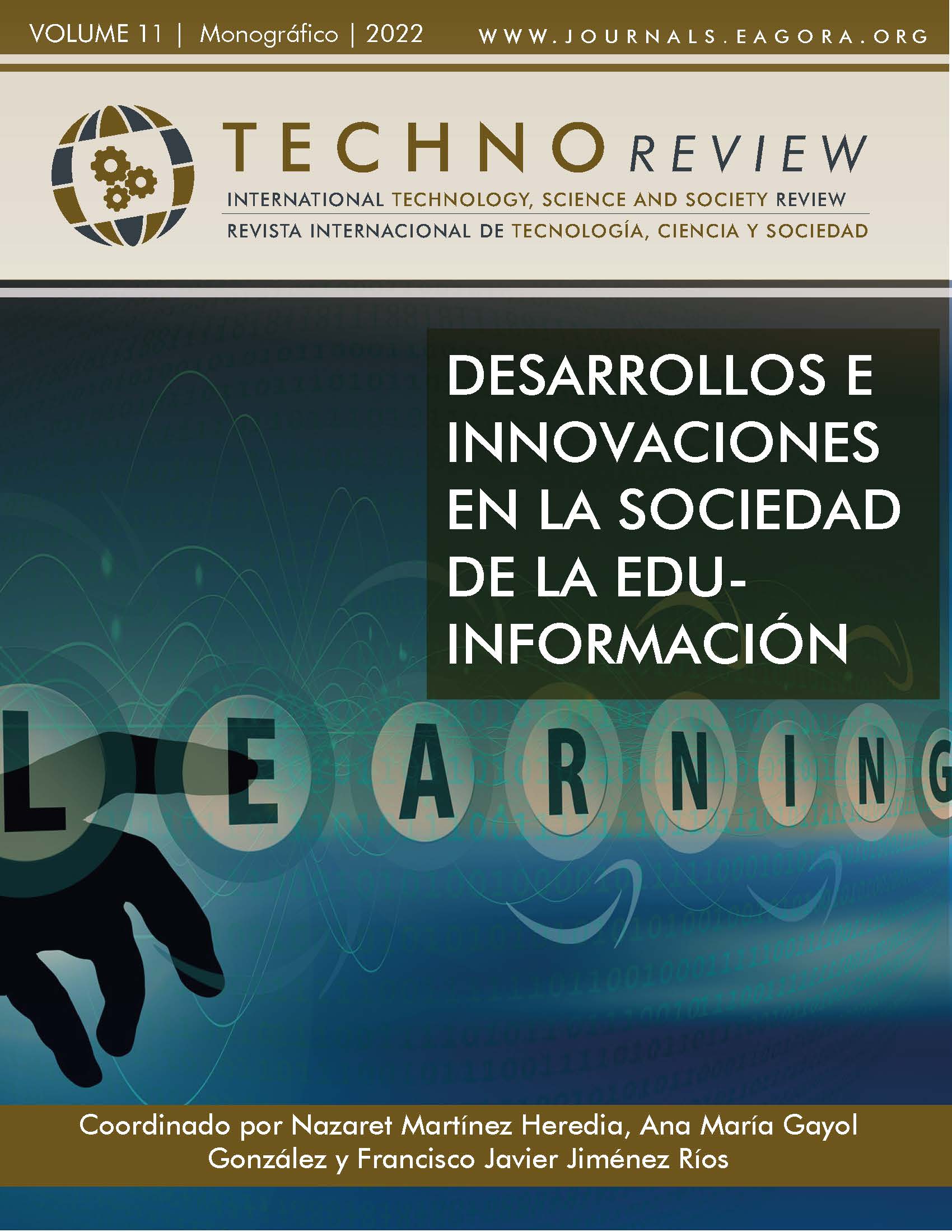Social Education Degree Student Facing Interdisciplinary Work
Challenges and opportunities for the development of good teaching
DOI:
https://doi.org/10.37467/revtechno.v11.3808Keywords:
Social education, Teaching, Innovation, Cooperation, Problem Based Learning, Methodology, Evaluation, InterdisciplinarityAbstract
The Social Education Degree of the UPV/EHU, based on a modular structure, through the linking of the different subjects, encourages students to acquire and develop the required skills through reflection processes based on real cases. For this article, the path taken by the teaching team and the students in the last eleven years has been analyzed in the module called "Educational professions". For this, a documentary analysis of the systematized material has been carried out over these years and two teachers who were part of the first teaching team have been interviewed.
References
Aguilar, S. y Barroso, J. (2015). La triangulación de datos como estrategia en investigación educativa. Pixel-bit.
Revista de medios y educación, (47), 77-88.
Amez, A., Arandia, M., Apodaca, P., Ávila, A., Echevarría, M. A., Fernandez, L., Gogeaskoetxea, A., Gonzalez, V., Larrazabal, L., Maguregi, G., Martínez, I., Otaño, J., Uriarte, J., Uskola, A. & Vasconcelos, M. (2008). Mirando al futuro de la formación inicial en Educación Social: pinceladas sobre un proceso colaborativo entre universidad y el sector profesional. Gizaberri, 1, 13-16.
Arandia, M. & Fernandez, I. (2012). ¿Es posible un curriculum más allá de las asignaturas? Diseño y práctica del grado de Educación Social en la Universidad del País Vasco. Revista de Docencia Universitaria, 10(3), 99-123.
Arandia, M., Cruz, E., Alonso, I. & Fernández, B. (2014). La incorporación de la voz del alumnado en el desarrollo de una estructura curricular modular. La experiencia del grado de educación social en la UPV-EHU. Tendencias Pedagógicas, 23, 215-236.
Alonso, I. (2015). Cambios en la identidad y cultura docente en procesos de innovación educativa en la Educación Superior. Estudio de un caso [Tesis]. Leioa: UPV/EHU.
Berciano, A, Bilbao, B., Ezkurdia, G., Gutiérrez, G. & Díaz, J. (2011). Una nueva experiencia docente en Magisterio. Ponencia presentada en el III Congreso Internacional. La autogestión del aprendizaje, Barcelona. https://dugi-
doc.udg.edu/bitstream/handle/10256/3693/242.pdf?sequence=1&isAllowed=y
Boyer, E. L. (1990), Scholarship reconsidered: Priorities of the professoriate. (PDF), Washington DC: Carnegie Foundation for the Advancement of Teaching.
Camargo, B. V. y Justo, A. M. (2013). IRAMUTEQ: um software gratuito para análise de dados textuais. Temas em psicologia, 21(2), 513-518. http://dx.doi.org/10.9788/TP2013.2-16
Denzin, N. K. (2009). The elephant in the living room: Or extending the conversation about the politics of evidence. Qualitative research, 9(2), 139-160. https://doi.org/10.1177/1468794108098034
Graaff, E. & Kolmos, A. (eds.) (2007). Management of change: Implementation of problem-based and project- based learning in engineering. Rótterdam: SensePublishers
Idoiaga, N., Gil De Montes, L. & Valencia, J. F. (2015). Communication and representation of risk in health crises: The influence of framing and group identity. Revista De Psicología Social: International Journal of Social Psychology, 31(1), 59-74. doi: https://10.1080/02134748.2015.1101313
Larruzea-Urkixo, N., Cardeñoso, O. & Idoiaga, N. (2019a). Emozioak unibertsitateko ikasketa prozesuen ardatz: Lehen Hezkuntzako Graduaren kasua. Tantak, 31(1), 177-194.
Larruzea-Urkixo, N., Cardeñoso, O. & Idoiaga, N. (2019b). El alumnado del Grado de Educación ante las tareas universitarias: emoción y cognición. Educación XX1, 23(1), 197-220.
López i Zaguirre, R. & Quetglas, B. (2014). Bolonia y los educadores y educadoras sociales. La visión del colectivo profesional. RES, 19. http://www.eduso.net/res/winarcdoc.php?id=381 [Consultado: 09/04/2020].
Molina, F., Casado Gual, N., & Stončikaitė, I. (2018). University stakeholders, intergenerational relationships and lifelong learning: a European case study. Educational Gerontology, 12(44), 744-752.
Morales, P. & Landa, V. (2004). Aprendizaje basado en problemas, Theoria, 13 (1), 145-157.
Paricio, J., Fernández, A. & Fernández, I. (eds.) (2019). Cartografía de la buena docencia universitaria: un marco para el desarrollo del profesorado basado en la investigación. Madrid: Narcea Ediciones.
Reinert, M. (2003). Le rôle de la répétition dans la représentation du sens et son approche statistique par la méthode «ALCESTE». SEMIOTICA-LA HAYE THEN BERLIN, 147(1/4), 389–420.
Reinert, M. (1987). Classification Descendante Hierarchique et Analvse Lexicale par Contexte-Application au Corpus des Poesies D’A. Rihbaud. Bulletin of Sociological Methodology, 13(1), 53–90.
Reinert, M. (1998). Quel objet pour une analyse statistique du discours? Quelques réflexions à propos de la réponse Alceste. JADT, 557–569. https://www.image- zafar.com/sites/default/files/publications/jadt1998nice.pdf
Restrepo, B. (2005). Aprendizaje basado en problemas: una innovación didáctica para la enseñanza universitaria. Educación y Educadores, 8, 9-19.
Vallés, M. (2002). Entrevistas cualitativas. Cuadernos metodológicos. Madrid. CIS.
Villa, A. (coord.) (2004). Libro Blanco Título de grado en Pedagogía y Educación social. Madrid: ANECA. http://www.aneca.es/Documentos-y-publicaciones/Libros-Blancos [Consultado: 09/04/2020].
Zabalza, M. A. (2003). Competencias docentes del profesorado universitario: Calidad y desarrollo profesional. Madrid: Narcea Ediciones.Baynes, T. D. (2019). More than a spasm, less than a sign: Queer masculinity in American visual culture, 1915-1955. [Doctoral Thesis] The University of Western Ontario. Electronic Thesis and Dissertation Repository, 6238. https://ir.lib.uwo.ca/etd/6238
Downloads
Published
Issue
Section
License
Copyright (c) 2022 TECHNO REVIEW. International Technology, Science and Society Review /Revista Internacional de Tecnología, Ciencia y Sociedad

This work is licensed under a Creative Commons Attribution-NoDerivatives 4.0 International License.
All articles are published under an Attribution-NoDerivatives 4.0 International (CC BY-ND 4.0) license. Authors retain copyright over their work.

